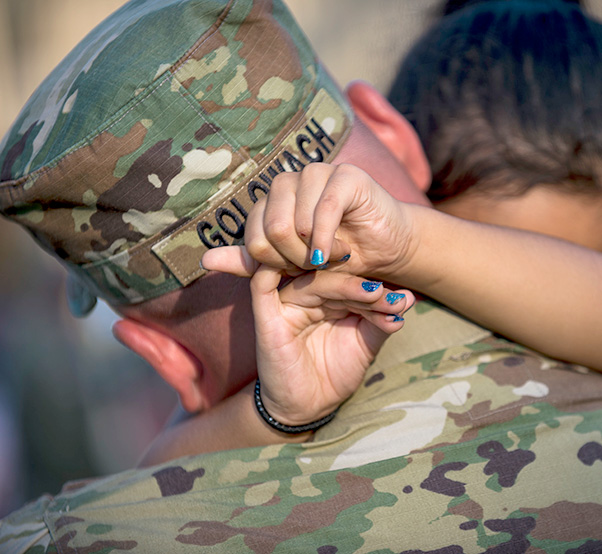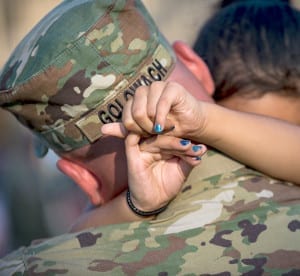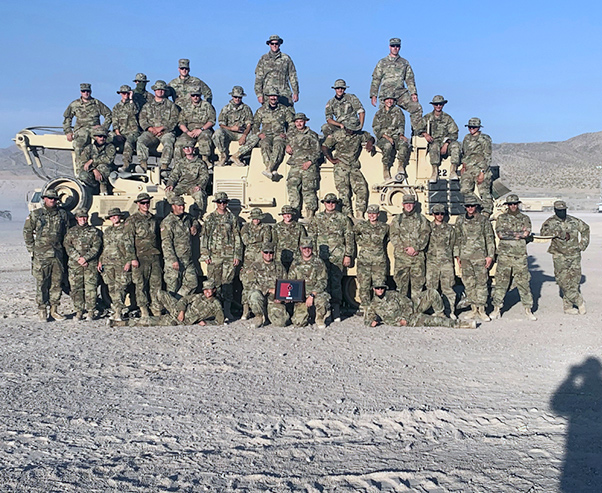Staff Sgt. Eric Golowach, a reservist with the 443rd Military Police Company of Owings Mills, Md., embraces his daughter, Mia, 4, after returning from a 10-month deployment to Guantanamo Bay, Cuba, Sept. 9. Army children have been a popular and important topic at the Family Forums held this week during the Association of the United States Army’s Annual Meeting and Exposition this week. Army leaders pledged to review child care options and hours.
The Army’s top leaders have announced that the Army will pause expected cuts to Family, Morale Welfare and Recreation programs and Army Community Services pending a holistic review.
Secretary of the Army Eric K. Fanning gave the news to a group of spouses at the third Family Forum of the Association of the United States Army’s Annual Meeting and Exposition Oct. 5. He and Chief of Staff of the Army Gen. Mark A. Milley, together with other leaders, will review the proposed cuts to ensure the needs of the Army, Soldiers and families are being met, Fanning said.
“We wanted to get your input on it and make sure we’re in sync with the Department of Defense, the secretary of Defense and Congressional intent,” Fanning said. “There are a couple of issues baked into that. The first is how much we spend and … a review of that. The second is giving garrison commanders some flexibility in how they spend those funds. It’s generally our intent to give commanders flexibility wherever we can and authority to make decisions on a more local level.”
The needs of families overseas or at an isolated post like Fort Irwin, California — which is in the middle of the Mojave Desert and hosts the National Training Center — are quite different than, say, Colorado Springs, Colorado, which has many local amenities, Sgt. Maj. of the Army Daniel Dailey pointed out.
In fact, he said, “It would be irresponsible for me … to say what’s right for family members at the National Training Center or in Colorado Springs or in the great place of Fort Hood, Texas. I think that the families and the senior mission commanders and the garrison commanders are the ones that have to do that.”
“We do absolutely take into consideration the locations, the geographic locations of a given installation and what services are available in the local communities,” agreed Milley. “So, [Fort] Irwin, austere environment, great post, but most of the services at Irwin have to be on Irwin. You can’t access or do outreach to a local community.”
Army leaders want to get those decisions right, he continued. Milley believes caring for families is crucial for readiness. A Soldier can’t deploy and fulfill his mission well if he’s also worried about his family at home. A major component of that is Child care.
Fanning said he has asked about child care more than anything else. He has ordered a review and expects a report this month. While the Army already offers high-quality, reliable child care, he admits it can do better. Soldiers and their families often need extended child care hours to complete their missions, for example.
“[The plan is to give] commanders flexibility to extend [child care hours] further in response to whatever needs the garrison might have,” Fanning said. “We’ve piloted those in a couple of places this year. … I hear you that this is an important concern. We’re committed to making sure that you have access to good, quality child care.”
As one audience member in the forum pointed out, Guard and Reserve Soldiers often need child care during their drill weekends and training missions. The Army is working on that, said Dailey, but there won’t be an easy solution.
“[It’s] very difficult,” Dailey explained, “if you can understand the complexity of hometown America and how dispersed these Guard and Reserve forces are. You can’t send them around necessarily to Guard and Reserve centers either, because Soldiers are further dispersed.”
“I think it’s a unique situation and a unique solution for each community we work in,” Dailey continued, “and we’re going to rely heavily on the leadership within the Guard and Reserve to find that solution.”













